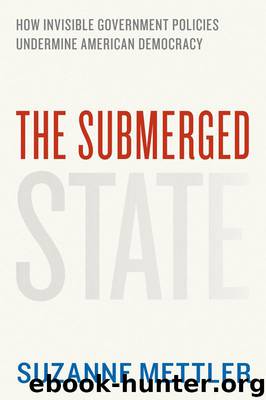submerged state how invisible government policies undermine american democracy by Suzanne Mettler

Author:Suzanne Mettler [Mettler, Suzanne]
Language: eng
Format: mobi
Published: 0101-01-01T00:00:00+00:00
5 · SUSTAINING AND EXPANDING THE SUBMERGED STATE
Tax Policy and Health Care Reform
After intense and protracted battles over health care reform throughout most of 2009, on Christmas Eve the Senate approved legislation by the requisite sixty votes to prevent a filibuster. As Congress adjourned for the holidays, proponents of reform in Washington, D.C., breathed a sigh of relief, believing that a signing ceremony would soon be in order. But in mid-January, as policymakers readied for final votes in each chamber on a merged bill, suddenly everything changed. When Republican candidate Scott Brown won an upset victory over Democrat Martha Coakley in the special election for the Massachusetts Senate seat, it ended the Democrat’s filibuster-proof majority, tearing asunder the plans for the law’s final enactment. It also symbolized, to many, a mid-course, popular referendum on Obama’s reform agenda.
During the long months while interest groups had lobbied aggressively on health care policy and political elites had negotiated, maneuvered, and cut deals, ordinary citizens increasingly perceived themselves to be cut out of the loop. Members of the public who just fifteen months earlier had rallied behind candidate Barack Obama—believing him to be the agent for change who could transcend “politics as usual” and bring the needs of the people to the fore—had grown either complacent or, worse, restive. Asked to explain her vote for Scott Brown, lifelong Democrat Marlene Connolly of North Andover, Massachusetts, said, “I voiced my opinion and voted for a Republican, and the roof did not cave in. I can’t believe I’m saying this . . . but I think I am now a Republican. I’m just devastated by what Obama’s doing. I don’t think he cares enough about anything other than his own personal agenda or this foolish health care bill. . . . It bothered me very much that it’s Kennedy’s seat, that did bother me. But the health bill totally upsets me. First of all, do we really know what’s going on with it? It’s always evasive when they’re talking about it.”1
Brown’s startling victory represented a public backlash against the politics of the submerged state, against the manner in which even efforts to reform it revolved around elites and organized interests, leaving the public feeling confused and excluded, their pressing needs seemingly forgotten. Throughout 2009, ordinary Americans could not help but see the mobilization of powerful interest groups and the fact that many of their demands were accommodated through the political process. A poll in October asked respondents how much of the blame for the difficulty in passing health care reform legislation was attributable to “special interest groups such as big pharmaceutical and health insurance companies.” Fully 49 percent answered “a great deal,” and 26 percent said “quite a bit”; only 15 percent said “very little,” and 5 percent, “none at all.”2 A few months later, pollsters talked to individuals who opposed the health care proposals being discussed in Congress. They asked them the extent to which their stance could be explained as “too much of the process took place behind closed doors and involved too much deal-making.
Download
This site does not store any files on its server. We only index and link to content provided by other sites. Please contact the content providers to delete copyright contents if any and email us, we'll remove relevant links or contents immediately.
The Secret History by Donna Tartt(16606)
The Social Justice Warrior Handbook by Lisa De Pasquale(11485)
Thirteen Reasons Why by Jay Asher(7777)
This Is How You Lose Her by Junot Diaz(5747)
Weapons of Math Destruction by Cathy O'Neil(5027)
Zero to One by Peter Thiel(4815)
The Myth of the Strong Leader by Archie Brown(4783)
Promise Me, Dad by Joe Biden(4439)
Stone's Rules by Roger Stone(4409)
Beartown by Fredrik Backman(4399)
How Democracies Die by Steven Levitsky & Daniel Ziblatt(4391)
The Fire Next Time by James Baldwin(4336)
100 Deadly Skills by Clint Emerson(4069)
A Higher Loyalty: Truth, Lies, and Leadership by James Comey(4024)
Rise and Kill First by Ronen Bergman(4007)
The David Icke Guide to the Global Conspiracy (and how to end it) by David Icke(3874)
The Farm by Tom Rob Smith(3868)
Secrecy World by Jake Bernstein(3773)
The Doomsday Machine by Daniel Ellsberg(3725)
